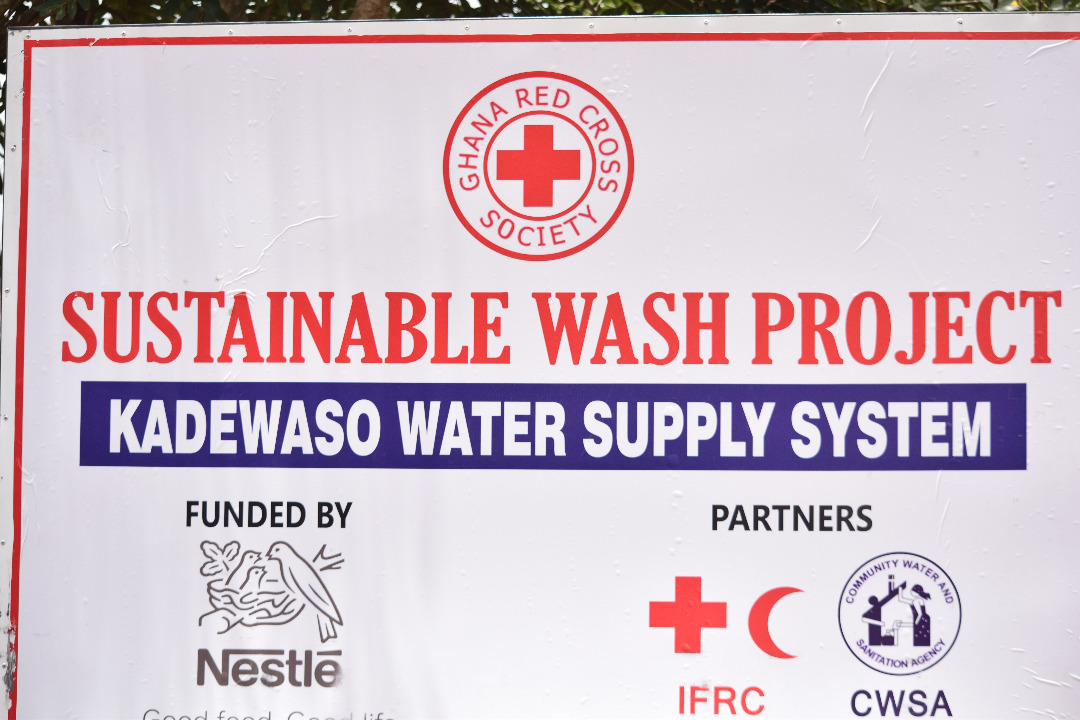To mark World Water Day this year, Nestlé Ghana Ltd. and the Ghana Red Cross Society have commissoned a mechanized borehole system in Kadewaso in the Atiwa District, Eastern Region. This borehole system is one of twelve water supply systems, constructed to improve access to safe water in cocoa-growing communities in the Eastern and Ashanti Regions, under the Ghana Sustainable Water, Sanitation and Hygiene Project (Ghana-WASH). The Ghana-WASH Project aims to enhance community resilience by providing clean water to farming communities under the Nestlé Cocoa Plan in Ghana. So far, the project has offered 115,761 people access to safe water. Ghana-WASH also inspires behavioural change in these communities through the promotion of practices like handwashing. A total of 186,255 people have been impacted with health and hygiene education.
To ensure sustainability, the water system in Kadewaso is powered by a hybrid system which uses solar power as its main power source and the national grid as a back up. It pumps groundwater into a 50,000 litre overhead steel tank, that supplies clean water through pipes closer to residents. Vending points are strategically located in the communities to reduce time spent by residents on fetching water. These water points dispense water automatically through the use of tokens loaded with “e-credits”, which allows for responsible and convenient use day and night. The water supply system in Kadewaso, which is one of several put up by the Ghana Red Cross with support of Nestlé, gets its water from below the ground, coherent with the World Water Day theme this year: Groundwater – making the invisible, visible.
Speaking at the ceremony, the Managing Director of Nestlé Ghana Ltd., Georgios Badaro highlighted the importance of the project saying, ”I am delighted that the WASH intervention continues to provide clean water which reduces the risk of water-borne diseases and the time spent by mostly women and children to fetch water from sources far away from their households.” He also expressed gratitude to the Red Cross as the implementing partner of the project, who have ensured that sustainable, potable water reaches even the remotest of communities.
In his remarks, The President of the Ghana Red Cross, Kwame Gyimah-Akwafo noted that, ”The Ghana Red Cross Society in collaboration with its partners, will continue to strengthen water systems to improve long-term sustainability of such projects. We will continue to facilitate access to safe water equitably enjoyed by all in project communities, especially women, children, and people with disabilities.”
The District Chief Executive, Honourable Kwabena Panin Nkansah, thanked Nestlé and Red Cross, saying that respources that would have otherwise been used to provide such a water system could now be allocated to other important sectors in the district.
Bhupinder Tomar, International Federation of Red Cross and Red Crescent Societies (IFRC), Head of the Cluster Delegation for Benin, Ghana, Nigeria and Togo, during his speech, highlighted the communal responsibility residents should have to ensure that the water supply systems are properly taken care of for the longer term. “I hope that when I visit Kadewaso in the next 5 or 10 years, I will still see water running from these pipes.”
Nestlé and the Red Cross Society have a long-standing partnership. Over the last two years, the two organizations responded to the COVID-19 pandemic through donation of supplies, including medical equipment and food for the less privileged, amongst others.


